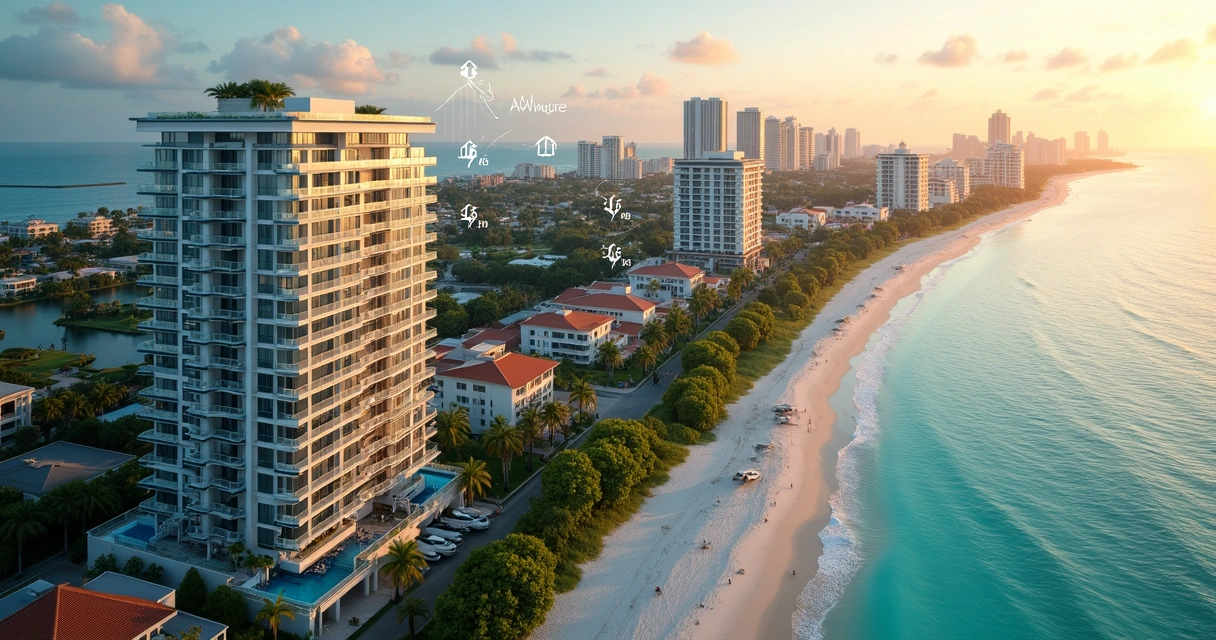If you’re reading this, there’s a good chance you’re dreaming of investing in the U.S. real estate market. Maybe you’re envisioning a downtown condo, a sunny holiday townhouse, or an income-generating apartment block. Whatever your goal, the idea of buying property in the United States as a non-resident is both exciting and, when I think through my past clients’ experiences, a bit intimidating. There’s the whole matter of access to loans, understanding the paperwork (which, frankly, can be confusing even for locals), and the unique requirements that come with being a foreign investor.
But let me say right at the start: foreign buyers absolutely can finance property in the U.S. using specialized mortgage and investment loan products. The landscape has evolved. Today, even non-citizens without social security numbers or U.S. credit histories have real, tangible pathways to become property owners or real estate investors stateside.
Having worked closely with Heart Mortgage, I’ve seen how tailored advice and proactive support truly change the game—especially for international borrowers. In this guide, I’ll walk you through the most relevant property financing options for non-residents, the hurdles you might face, and how to get your foot on the property ladder (or, if you’re an experienced investor, the next rung).
Why invest in U.S. property as a foreigner?
I often get asked why overseas buyers are so interested in the American market. The answer, in my view, comes down to a few core factors:
- The U.S. market is famously stable and transparent, especially compared to many developing economies.
- Financing options—including non-resident loans—allow buyers to maintain liquidity and use leverage, rather than tying up all their cash.
- There are often fewer restrictions on property ownership for foreigners in the U.S. compared to other nations.
- Potential for strong rental yields and property appreciation, especially in growth cities.
Based on U.S. Bureau of Labor Statistics data, foreign ownership and investment are not only accepted but actively shape local economies and job markets.
Opportunities and challenges for foreign buyers
As optimistic as the above sounds, I want to be honest: foreign investors face more documentation hurdles and stricter requirements for mortgage approval than U.S. residents. Your path might not always be straightforward, but you certainly do not need to be a U.S. citizen or green card holder to qualify for investment property loans.
What’s different for foreigners?
- Higher minimum down payments (often 20-40%, compared to 3-20% for locals)
- No requirement for U.S. credit score, but you may need to show international credit or robust financials
- Proof of foreign income and/or assets might be scrutinized more closely
- Specialized documentation, like valid visas, ITIN (Individual Taxpayer Identification Number), or foreign credit reports
- Possibly higher interest rates due to added lender risk
The regulatory environment has started to reflect the growing importance of foreign buyers. According to The Regulatory Review’s summary, foreign investment in U.S. real estate has now surpassed $1.2 trillion in the past 15 years. The impact isn’t just on urban apartments—it extends to agricultural and commercial property types as well.
Special mortgage products for non-residents are widely available—if you know where to look.
Types of property financing for non-resident investors
Not all loans are alike. In my experience, once you understand the options, picking the right structure for your investment gets much simpler. When working with Heart Mortgage and similar teams, we usually break down loan types like this:
Foreign national mortgage loans
Foreign national loans are designed specifically for people without U.S. citizenship, permanent residency, or even a local credit report. They focus mostly on property’s income potential, borrower’s foreign credit, and overall financial strength.
- Typically available for residential and some commercial properties
- Down payment: usually 25-35%
- Interest rates: Slightly above average local rates, reflecting perceived risk
- Can be structured as fixed-rate or adjustable-rate, just like regular U.S. mortgages
You’ll find more details about how these loans work and what requirements matter most in Heart Mortgage’s own foreign national mortgages guide. It’s an excellent overview if you like hands-on case studies.
DSCR loans for international investors
Debt Service Coverage Ratio (DSCR) loans are increasingly popular for investors from abroad. Unlike traditional loans that focus on the borrower, DSCR mortgages focus on the property’s income versus expenses. In other words, the rent or projected cash flow is compared to the monthly mortgage payments.
- Ideal for short-term rental (Airbnb-style) properties, multi-family, or commercial real estate
- Qualifying doesn’t revolve around personal income—it’s the property’s income that counts
- Lenders often require a DSCR (ratio) above 1.0, meaning projected rents exceed mortgage payments
This structure can work beautifully if your foreign income is hard for U.S. lenders to document, but you have a sound investment property lined up. If you’re interested, you’ll find more on these techniques in Heart Mortgage’s investment category articles.
Eligibility requirements and documentation
I’ve sat across the table from dozens of foreign clients over the years, and the list of needed documents is often their biggest concern. Let’s break it down. If you can show stable income (even abroad) and assets, you’re in a strong position.
Standard documentation list
- Copy of passport and U.S. visa, if applicable
- Proof of current residence abroad
- 2+ years of employment or business income records (tax returns, pay stubs, financial statements)
- Bank statements—often 2-6 months’ worth
- Foreign credit report (or letter of reference from your bank)
- Source of funds, especially for down payment
- ITIN (if applying for ITIN loans, more below)
These requirements might sound long, but in my experience, most investors can pull them together with help from a mortgage specialist. If your income proof or documents vary from bank to bank, or your local tax returns are different than what U.S. lenders usually see, a good mortgage advisor (like those at Heart Mortgage) will guide you on supplementary options.
There’s an extensive deep-dive on eligibility for non-citizens at this guide for non-citizens, which I found surprisingly useful.
Cash requirements and down payment
One thing I’ve learned: U.S. lenders almost always expect higher down payments from foreigners—often 20-40% of the property price. The exact figure depends on your loan type, property, and personal profile. Luxury and commercial properties tend to have stricter cash equity requirements. Your funds must be sourced and “seasoned” (held in an account for at least a few months) to comply with anti-money-laundering laws.
ITIN loans and special-case programs
Maybe you don’t have a social security number. That’s not a barrier. Many foreign nationals qualify for mortgages using an Individual Taxpayer Identification Number (ITIN) instead of a SSN. ITIN loans help buyers build a credit record in the U.S. and open up purchasing opportunities.
- Ideal for non-residents who pay U.S. taxes or own property but lack status
- Rates and terms are similar to other foreign national loan products
- Some ITIN loans allow property purchases for family members as well
I recall one client—a Brazilian entrepreneur—using an ITIN loan to buy his second rental house in Florida. He was still expanding his business, so he wanted maximum flexibility and minimal upfront hassle. These loan programs really changed things for him. A full rundown is available on how to finance property in the U.S. without a green card.
Types of properties you can finance
Here’s where things get interesting. Did you know that foreigners can finance many types of real estate, not just condos or houses? In my research, eligible properties usually fall into these categories:
- Single-family homes: Often for vacation or rental
- Multi-family (2-4 units): Good for maximizing cash flow
- Condos and townhouses: Especially popular in metro and beach markets
- Commercial property: Like offices, retail, or mixed-use spaces
- Fix-and-flip projects: If you’re entering the renovation space
There are differences in terms and rates for commercial loans versus residential, but most non-residents focus on residential or mixed-use buildings. Did you know that according to research by the Federal Reserve Bank of Boston, international buyers have shaped entire neighborhoods and boosted local economies, especially in California? That highlights the opportunity, but also the need to buy wisely—preferably with good planning and specialist support.
Legal and closing process: What foreigners should expect
Depending on your nationality and the structure of your purchase, there may be extra legal hoops to jump through. From what I’ve observed:
- You don’t need to be present in the U.S. for the entire property buying process—remote closing is now common (though you’ll still need local legal representation)
- Expect to work with a closing attorney or title company for contract, taxes, and ownership transfer
- Foreign buyers may face additional property taxes or withholding (known as “FIRPTA”)
- Strong KYC (Know Your Customer) checks will be done to confirm identity and source of funds
If you want a full step-by-step on legal and closing issues, the Heart Mortgage blog outlines these steps really well in its articles on investment and purchase strategy, such as the one at 7 strategies to start investing in U.S. real estate.
Interest rates and fees: What’s the real cost?
Now for the nitty-gritty. If you’re wondering about costs, here’s what I usually see:
- Interest rates for non-citizen investment loans are typically 1-2% higher than standard local mortgages
- Some lenders add origination fees, processing fees, or foreign transaction “premiums” (read your loan estimate carefully!)
- Expect closing costs of 2-5% of the property value, which covers legal, title, and other transfer expenses
- Pre-payment penalties occasionally come up for investment loans—discuss this before signing
The upside is that, even with these extra costs, the long-term rental income and possible appreciation often outweigh the initial premium. Many of my clients look at financing as a way to multiply investment returns through leverage, and I can’t argue with that logic.
Picking the right lender and advisor
If there’s one piece of advice I’d highlight, it’s this: work with a team that understands the unique needs of foreign national investors. Not every loan officer or bank is equipped to handle complex international documentation. Look for firms that offer:
- Multilingual support and flexible communication methods (online, phone, in-person)
- Experience with cross-border finance and property transactions
- Direct connections to U.S. legal, tax, and escrow professionals
- Clear explanations of all possible loan products and closing costs
- Help with remitting funds, compliance, and getting the best terms possible
I’ve witnessed Heart Mortgage provide this level of tailored service, and it really gives buyers peace of mind. There’s something very reassuring about working with people who don’t just sell mortgages, but actually guide you from your first question to the moment you receive your title.
Summary and final thoughts
So, is it complicated? Maybe a little bit, but not impossibly so. Investment property loans for foreigners open the door to owning a slice of the U.S. real estate market, building wealth, and securing new opportunities no matter where you live. If you’re prepared and supported by the right advisors and lenders, you can leapfrog the old barriers.
If you want to see more in-depth tips, I recommend checking out Heart Mortgage’s main site or its resource guides. And if you’re ready for your next property investment step, reach out. The Heart Mortgage team and I believe that anyone, anywhere, can reach their real estate goals with clarity and the right help.
Frequently asked questions
What is an investment property loan for foreigners?
An investment property loan for foreigners is a mortgage designed for non-U.S. citizens or residents to purchase, refinance, or invest in property in the United States, often using alternative documentation or income sources from abroad. These loans are specifically structured for people without local credit histories and usually have flexible qualification criteria to accommodate international financial backgrounds.
How can foreigners qualify for property loans?
Qualifying typically depends on showing stable income (even outside the U.S.), documented assets, and a willingness to make a larger down payment. Most lenders require proof of identity, residency, and ability to repay, as well as a source of funds for both the down payment and closing costs. Specialized programs—like DSCR or ITIN loans—may also accept international credit reports or bank letters instead of a U.S. credit score.
Which countries offer loans to non-residents?
In my experience, the United States is one of the most open markets for non-resident property lending. Most major U.S. lenders and specialized mortgage companies will extend financing to citizens of nearly any country, provided legal compliance and anti-money-laundering checks are satisfied. Some particular programs may exclude countries under U.S. sanctions or with insufficient regulatory frameworks, but for the vast majority of international buyers, U.S. property loans are very accessible.
What documents do foreigners need for a loan?
Foreign investors usually need to present the following: a valid passport, proof of residence, bank statements, proof of foreign or U.S. income (tax returns or payslips), evidence of source and seasoning of funds, and sometimes a foreign credit report or a banker’s reference letter. Depending on the program, an ITIN, visa, or company incorporation documents may also be required.
Is it worth it for foreigners to get a property loan?
For many, the answer is yes—financing allows you to preserve cash, increase your property holdings, and capture rental or appreciation gains in the U.S. market. While there are extra costs and stricter requirements compared to domestic borrowers, the potential benefits are well-documented. As with any investment, success depends on careful due diligence and partnering with a knowledgeable lender and legal advisor, like Heart Mortgage, to secure your interests.





